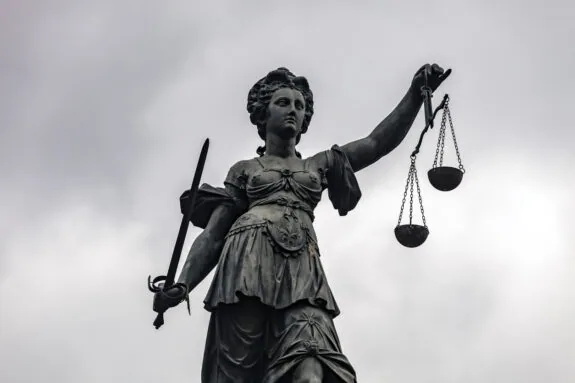Why Choose Us?
Federal counterfeiting charges can escalate quickly from an investigation to an arrest, exposing you to severe penalties and long-term consequences. Clients turn to Fast Law for precise analysis, focused advocacy, and defense strategies shaped by real federal courtroom experience.
- 5 Star Client Satisfaction
- Former Brooklyn Felony Assistant District Attorney
- Over 25 Federal and State Trials Led to Verdict
- Strategic Defense for Complex Federal Counterfeiting Allegations
- Immediate Case Assessment and Fast Legal Action
- FREE and Confidential Consultations
What Is Federal Counterfeiting?
Federal counterfeiting generally involves creating, altering, distributing, or possessing fake currency, documents, or goods with the intent to defraud. These offenses fall under federal jurisdiction because they threaten the integrity of the financial system, government functions, and interstate commerce.
Federal counterfeiting can involve:
- Fake or altered U.S. currency and securities
- Forged government documents, such as passports or IDs
- Counterfeit branded goods and packaging
- Unauthorized use of trademarks or logos to deceive buyers
Showing intent to defraud is central to many of these charges, which is where focused defense work begins.
How Do Federal Counterfeiting Charges Work in New York?
Federal counterfeiting investigations in New York are often handled by agencies such as the U.S. Secret Service, Homeland Security, and the FBI. These agencies build cases over time, focusing on networks, supply chains, and financial flows rather than isolated acts. Key features of federal counterfeiting cases include:
- Federal jurisdiction due to the impact on U.S. currency, government documents, or interstate commerce
- Use of surveillance, undercover operations, and controlled buys
- Analysis of printing equipment, digital files, and manufacturing tools
- Coordination with customs and border authorities when goods are imported
Penalties for Federal Counterfeiting in New York
Penalties for federal counterfeiting convictions are serious and often include lengthy prison sentences and substantial fines. The exact punishment depends on the statute charged, the scope of the alleged scheme, and any claimed financial loss. Possible consequences include:
- Up to 20 years in federal prison for certain currency and security offenses
- Significant fines and mandatory restitution to alleged victims
- Asset forfeiture related to proceeds and tools of the offense
- Immigration consequences for non citizens
- Lasting felony record that affects employment and licensing
Beyond the legal penalties, the stigma of a counterfeiting conviction can significantly limit professional and business opportunities.
Common Types of Federal Counterfeiting Crimes
Federal counterfeiting covers a wide range of conduct. Each type of allegation carries its own legal issues and evidentiary challenges. Common categories include:
- Currency counterfeiting: Creating, altering, or distributing fake U.S. bills or coins
- Counterfeit goods: Producing or selling fake branded products, including luxury items and electronics
- Trademark counterfeiting: Using logos, trade dress, or marks to mislead consumers about source or authenticity
- Counterfeit documents: Forged passports, visas, driver’s licenses, or other government documents
- Possession of counterfeiting tools: Holding plates, dies, printers, or digital files used to create counterfeit items
- Software and digital piracy: Unauthorized copying and distribution of protected software or digital products.
How Do Federal Investigators Build Counterfeiting Cases?
Federal investigators often approach counterfeiting as an organized or economic crime, targeting suppliers, distributors, and those controlling production rather than only front-line sellers. Investigations may involve:
- Monitoring shipments and imports
- Seizing goods at ports, warehouses, or retail locations
- Tracing financial transactions, payment platforms, and bank accounts
- Executing search warrants on homes, offices, and storage facilities
- Reviewing computers, printers, design files, and communication records
Because the government often relies on circumstantial evidence and inferences about intent, defense strategies can focus on challenging how investigators interpret communications, tools, and business practices.
Defenses Available in Federal Counterfeiting Cases
The best defenses depend on the specific allegations, evidence, and role attributed to the accused. In many counterfeiting cases, the government must prove not just possession of items but knowledge and intent to defraud. Potential defenses include:
- Mistaken identity: The wrong person is linked to the operation or account
- Illegal search and seizure: Evidence obtained without valid warrants or beyond lawful scope
- Lack of intent to defraud: No knowledge that items were counterfeit or no intent to mislead others
- Insufficient evidence: Weak or speculative proof of involvement in manufacturing or distribution
- Entrapment: Government conduct that induced someone to commit an offense they otherwise would not have committed
- Constitutional violations: Due process concerns, improper interrogations, or other rights violations
What Should You Do If You Are Under Investigation or Have Been Charged?
If you learn that you are under investigation for counterfeiting or have already been charged, how you respond can significantly influence your case. Speaking with investigators without counsel or ignoring early warning signs can make matters worse. Important steps include:
- Do not speak to investigators without an attorney present.
- Contact a federal defense lawyer immediately to understand your rights.
- Preserve records and communications that may be relevant to your defense.
- Avoid discussing the case with coworkers, friends, or on social media.
- Follow legal advice closely to avoid actions that could be misinterpreted as obstruction.
Learn the Process After an Arrest
- What to Expect at an Arraignment
- What to Know After You’re Arrested
- What Happens at a Bail/Bond Hearing
- Guide to Preliminary Hearings
- Understanding the Pre-Trial Process
Contact Our Federal Counterfeiting Defense Attorneys
Federal counterfeiting allegations can jeopardize your freedom, finances, and career. If you are under investigation or facing charges, you do not have to navigate the federal system alone. Contact Fast Law for a confidential consultation so we can review your situation and begin building a defense tailored to your needs and goals.
Fast Law is based in Manhattan and proudly serves clients across New York, including Brooklyn, Manhattan, Queens, Nassau County, Suffolk County, and New Jersey.

